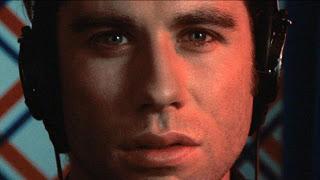
"Why the fuck does everything have to be a conspiracy?"
Brian De Palma specialized in hyper-stylized pastiches of older movies, with varying degrees of success. After his Hitchcock-inspired Dressed to Kill (1980), he turned to more recent thrillers for inspiration. Blow Out (1981) fulfills its brief as a tense thriller, even if little of it's original.Sound technician Jack Terry (John Travolta) is recording Foley for a horror movie outside Philadelphia when he witnesses a car crash. The driver is Governor McRyan, a popular presidential candidate; Jack manages to rescue Sally (Nancy Allen), a young woman who appears to be McRyan's mistress. Listening to his recording of the crash, Jack's convinced that it wasn't an accident - that the tire blowing out is preceded by a gunshot. As he pieces together the truth, he and Sally are harassed by police, hounded by reporters and stalked by an assassin (John Lithgow).
De Palma's obvious touchstones are Blow-Up and The Conversation, where the protagonist believes that he unwittingly recorded a murder. But Blow Out feels more like a holdover from the previous decade's conspiracy films, both in its paranoid story and the direction: certainly Vilmos Zsigmond's wide angle, deep focus photography recalls Gordon Willis' work for Alan J. Pakula. De Palma adds a few wrinkles of his own, like long-take murder scenes, split screen dialogues and an extended finale involving a mark wearing a wire reminiscent of Touch of Evil, with a car chase and fireworks thrown in.
At its best, Blow Up mixes thriller dynamics with a curdled commentary about shaping narratives. Jack creates a film strip of the accident using photographs and his own sound recordings, a homemade Zapruder film more compelling than his chintzy slasher flicks. There's a neat twist where the murder is a frame-up gone wrong, thanks to an overzealous operative who starts killing women wholesale. Which doesn't stop the photographer (Dennis Franz) from musing over how to exploit the assassination, or McRyan's aides trying to cover up their boss's peccadilloes. The bleak despair of The Parallax View and its ilk's replaced with Reagan-era cynicism that nothing matters, that everyone's shaping reality into stories that please them.
What's lacking is the measured atmosphere of the best thrillers. Never subtle on his best days, De Palma invariably prefers a sledgehammer to a scalpel. It's not enough that Jack agonizes over a past job that resulted in a colleague's death; we're treated to a long flashback depicting it in detail. The earlier films' musings on voyeurism are replaced with a snide recreation of slasher movies, complete with topless women screwing, showering and masturbating onscreen (since De Palma includes brutal murders and an attempted rape elsewhere, the intended effect's diluted). A crusty detective (John Aquino) helpfully spells out the conspiracy tropes Jack will encounter on his quest, a device too twee to seem clever. And Pino Donanggio's obnoxious score plays at full blast throughout, undercutting tense dialog scenes and set pieces alike.
John Travolta is well-cast here, channeling his boyish self-assurance into a determined hero. Nancy Allen's character never evolves past her first impression as a pleasant but hopeless ditz. John Lithgow channels Gordon Liddy with a staccato accent and abrasive cockiness that's both absurd and menacing. Dennis Franz, John Aquino, Robin Sherwood and Peter Boyden assay key supporting roles.
Blow Out's virtues mostly outweigh its vices. De Palma tells a nifty story with a memorably tart message; it's just a shame that he couldn't restrain his trademark excess.

